唐僧领导力 leadership,魅力型领导,支持型领导
如何做一名“魅力型”的现代领导者
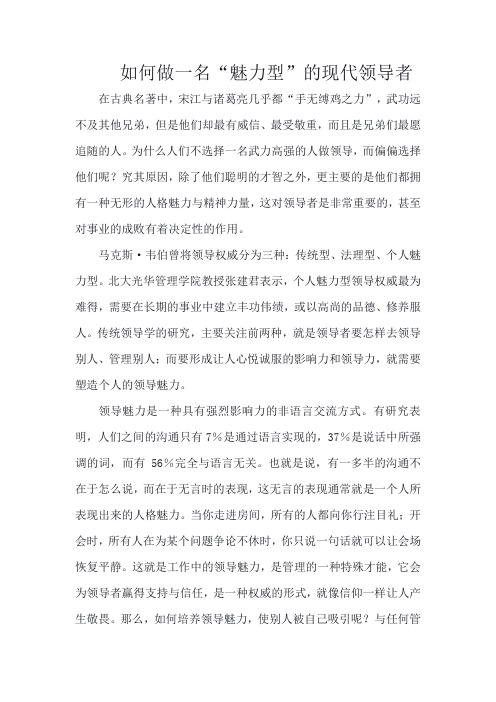
如何做一名“魅力型”的现代领导者在古典名著中,宋江与诸葛亮几乎都“手无缚鸡之力”,武功远不及其他兄弟,但是他们却最有威信、最受敬重,而且是兄弟们最愿追随的人。
为什么人们不选择一名武力高强的人做领导,而偏偏选择他们呢?究其原因,除了他们聪明的才智之外,更主要的是他们都拥有一种无形的人格魅力与精神力量,这对领导者是非常重要的,甚至对事业的成败有着决定性的作用。
马克斯·韦伯曾将领导权威分为三种:传统型、法理型、个人魅力型。
北大光华管理学院教授张建君表示,个人魅力型领导权威最为难得,需要在长期的事业中建立丰功伟绩,或以高尚的品德、修养服人。
传统领导学的研究,主要关注前两种,就是领导者要怎样去领导别人、管理别人;而要形成让人心悦诚服的影响力和领导力,就需要塑造个人的领导魅力。
领导魅力是一种具有强烈影响力的非语言交流方式。
有研究表明,人们之间的沟通只有7%是通过语言实现的,37%是说话中所强调的词,而有56%完全与语言无关。
也就是说,有一多半的沟通不在于怎么说,而在于无言时的表现,这无言的表现通常就是一个人所表现出来的人格魅力。
当你走进房间,所有的人都向你行注目礼;开会时,所有人在为某个问题争论不休时,你只说一句话就可以让会场恢复平静。
这就是工作中的领导魅力,是管理的一种特殊才能,它会为领导者赢得支持与信任,是一种权威的形式,就像信仰一样让人产生敬畏。
那么,如何培养领导魅力,使别人被自己吸引呢?与任何管理技巧一样,领导者可以通过学习和培养自己的领导魅力。
下面提供一些策略,可以引导领导者塑造自己独特的领导魅力。
第一,要形成标志性的仪态。
因为领导的特殊地位,当你进入办公区的那一刻,所有的员工都会开始审视你,他们会注意你走路的姿势、神情,还有穿着打扮。
这听起来或许有些可笑,但事实就是这样,员工们在你说话之前就已经在心里对你有所判断、评价了,你所表现的整体气质对你来说意义深远。
形象专家表示,给他人留下的第一印象有一半以上来自于外在形象。
从西天取经看唐僧的领导力

郑州航空工业管理学院2013-2014学年第二学期领导力课程论文从西天取经看唐僧的领导力姓名:***班级:1102072学号::*********二О一四年六月六日目录内容摘要 (1)关键词 (1)引言 (2)一、唐僧能坚持清晰的组织方向和使命 (2)二、唐僧是深得人心的魅力型领导 (2)三、唐僧能知人善任,充分发挥每一个成员的作用 (3)四、唐僧建立的是一个扁平化组织结构、保证组织运行效率 (4)五、唐僧对员工采用的是高关怀高工作模型 (4)六、唐僧采用了有效的人才激励措施 (4)七、唐僧采用了有效的组织控制——情感管理与以权制人 (5)八、唐僧善于协调内外关系,能保证团队的稳定 (6)1. 外部协调工作 (6)2. 内部协调工作: (6)九、唐僧的领导力方面存在的问题 (6)1. 自身能力有待提高............................ 错误!未定义书签。
2.员工的教育时方法不合适....................... 错误!未定义书签。
小结.............................................. 错误!未定义书签。
内容摘要作为明清小说中的经典——《西游记》早已深入人心,暂且不论历史虚实,就《西游记》中打造的人物形象方面可谓是活灵活现、入木三分,以至于后人对于罗贯中的小说津津乐道,甚至有人以《西游记》为原型中唐僧的领导力为主题,结合现代领导力,研究领导必备的领导品质领导艺术。
我们知道,《西游记》中的每一个角色都是性格迥异,特长不一的,就是这样四个完全不同的人因为共同的使命走到了一起——西天取经。
《西游记》中唐僧的领导力是贯穿始终的,整个唐僧团队的使命最终完成,就是唐僧领导力的体现。
师徒四人历经磨难最终取到真经,唐僧的领导力体现在什么地方?本文从唐僧的高水平的用人艺术和管理才能、高效率的团队意识,人际关系处理的如何关键词:西游记唐僧团队唐僧的领导力以情动人知人善任从西天取经看唐僧的领导力引言领导是人们生活中极其熟悉的名词,但是如何领导却是大多数人所不了解的。
论魅力型领导
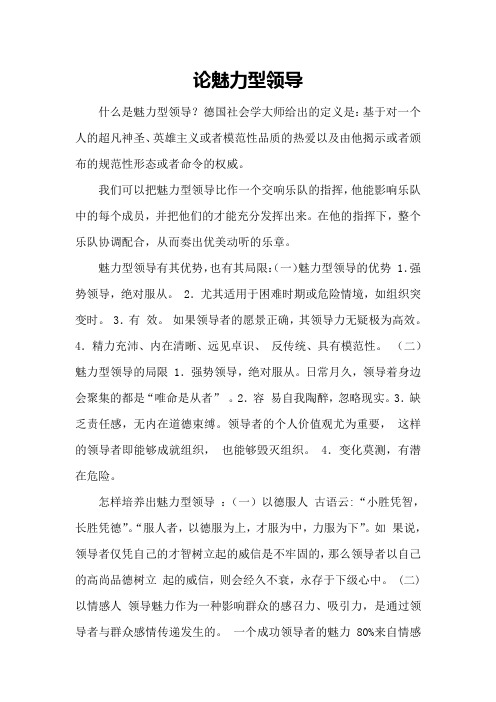
论魅力型领导什么是魅力型领导?德国社会学大师给出的定义是:基于对一个人的超凡神圣、英雄主义或者模范性品质的热爱以及由他揭示或者颁布的规范性形态或者命令的权威。
我们可以把魅力型领导比作一个交响乐队的指挥,他能影响乐队中的每个成员,并把他们的才能充分发挥出来。
在他的指挥下,整个乐队协调配合,从而奏出优美动听的乐章。
魅力型领导有其优势,也有其局限:(一)魅力型领导的优势 1.强势领导,绝对服从。
2.尤其适用于困难时期或危险情境,如组织突变时。
3.有效。
如果领导者的愿景正确,其领导力无疑极为高效。
4.精力充沛、内在清晰、远见卓识、反传统、具有模范性。
(二)魅力型领导的局限 1.强势领导,绝对服从。
日常月久,领导着身边会聚集的都是“唯命是从者”。
2.容易自我陶醉,忽略现实。
3.缺乏责任感,无内在道德束缚。
领导者的个人价值观尤为重要,这样的领导者即能够成就组织,也能够毁灭组织。
4.变化莫测,有潜在危险。
怎样培养出魅力型领导:(一)以德服人古语云:“小胜凭智,长胜凭德”。
“服人者,以德服为上,才服为中,力服为下”。
如果说,领导者仅凭自己的才智树立起的威信是不牢固的,那么领导者以自己的高尚品德树立起的威信,则会经久不衰,永存于下级心中。
(二)以情感人领导魅力作为一种影响群众的感召力、吸引力,是通过领导者与群众感情传递发生的。
一个成功领导者的魅力 80%来自情感方面,20%来自智慧方面。
(三)以智抵人不仅要求领导者要理性,富于见识、经验丰富、办事公道、讲求韬略。
还要求领导者对人性有深入的分析,发扬人性中的积极成分,同时又能控制人性消极的成分,从而提高效能,出现整体功能大于要素功能之和的最佳效应,这是领导者的大智慧。
(四)以形悦人群众在观察了解领导者的时候,总是从观察象开始的,因而要求领导者注意自己的形象,塑自己的形象魅力,其次,形象魅力还包括领导者的仪态表、言谈举止。
这就是形象原则。
(五)以己正人“职别”是指领导者在组织中的职位和领导者的级别。
简论影响世界的三种领导风格

简论影响世界的三种领导风格作者:邹金彤来源:《媒体时代》2013年第04期摘要:纵观人类历史,每一位杰出的领导者都在用各自的领导风格影响着世界。
独裁型的“地产之王”唐纳德·特朗普创造了美国式的成功;仆人型的亚伯拉罕·林肯统一了美国南北,废除了黑奴制度;魅力型的圣雄甘地为印度人民带来了国家的独立与自治。
这些领导者拥有不同的身份,具备不同的特质,但无一例外的是,他们用自己的领导力,带领他们的追随者走进了一个不一样的世界。
关键词:领导力领导风格传媒产业一直以来,人们对帝王将相和商政精英的好奇让“领导力”成为经久不衰的话题。
然而,领导力并非精英们独有的特殊技能,人类的群体性决定了领导力与每个人的生活都息息相关。
每一种组织机构,每一个社交团体,乃至每一次的群体活动,都需有领导力的作用,才能正常运作。
因此可以说,我们每一天都生活在领导者和他们的领导力给我们带来的影响中。
领导者与管理者不尽相同。
管理者通常需要外在赋予的权力,而领导者并不依赖头衔和官职,他们的影响力时常出自于内在品格与能力。
管理者通常具有理性与冷静的特点,本分尽职,具备组织性与实践性;而领导者通常是真知灼见者,他们充满创造力,敢于实验,在某种程度上,他们还是冲动敢为的。
领导者能够通过自身的影响力帮助他人面对和处理生活中的改变,甚至能改变他人的想法和行为。
而不同领域的成功领导者,往往也拥有各自不同的领导风格。
本文主要关注三种影响深远的领导风格,即独裁型、仆人型、魅力型,并对它们各自的特点、优势与弊端进行分析。
另外,根据传媒产业的特性,本文还将简述杰出的传媒领导者所需具备的特征。
独裁型领导者“你被开除了!”——唐纳德·特朗普唐纳德·特朗普是美国著名的“地产之王”,他被认为是典型的独裁型领导者。
有人评价,特朗普跌宕起伏的传奇人生,简直就是美国式成功的完美定义。
对于独裁型领导而言,手握权力是领导力的核心。
特朗普也是如此。
6种有效的领导风格
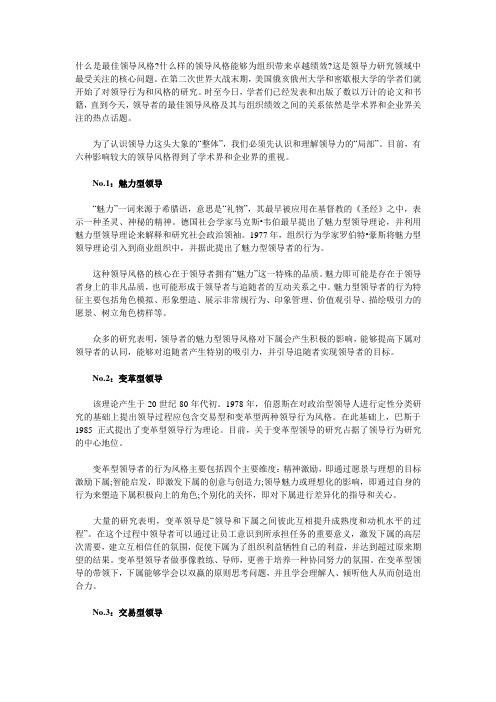
什么是最佳领导风格?什么样的领导风格能够为组织带来卓越绩效?这是领导力研究领域中最受关注的核心问题。
在第二次世界大战末期,美国俄亥俄州大学和密歇根大学的学者们就开始了对领导行为和风格的研究。
时至今日,学者们已经发表和出版了数以万计的论文和书籍,直到今天,领导者的最佳领导风格及其与组织绩效之间的关系依然是学术界和企业界关注的热点话题。
为了认识领导力这头大象的“整体”,我们必须先认识和理解领导力的“局部”。
目前,有六种影响较大的领导风格得到了学术界和企业界的重视。
No.1:魅力型领导“魅力”一词来源于希腊语,意思是“礼物”,其最早被应用在基督教的《圣经》之中,表示一种圣灵、神秘的精神。
德国社会学家马克斯•韦伯最早提出了魅力型领导理论,并利用魅力型领导理论来解释和研究社会政治领袖。
1977年,组织行为学家罗伯特•豪斯将魅力型领导理论引入到商业组织中,并据此提出了魅力型领导者的行为。
这种领导风格的核心在于领导者拥有“魅力”这一特殊的品质。
魅力即可能是存在于领导者身上的非凡品质,也可能形成于领导者与追随者的互动关系之中。
魅力型领导者的行为特征主要包括角色模拟、形象塑造、展示非常规行为、印象管理、价值观引导、描绘吸引力的愿景、树立角色榜样等。
众多的研究表明,领导者的魅力型领导风格对下属会产生积极的影响,能够提高下属对领导者的认同,能够对追随者产生特别的吸引力,并引导追随者实现领导者的目标。
No.2:变革型领导该理论产生于20世纪80年代初。
1978年,伯恩斯在对政治型领导人进行定性分类研究的基础上提出领导过程应包含交易型和变革型两种领导行为风格。
在此基础上,巴斯于1985正式提出了变革型领导行为理论。
目前,关于变革型领导的研究占据了领导行为研究的中心地位。
变革型领导者的行为风格主要包括四个主要维度:精神激励,即通过愿景与理想的目标激励下属;智能启发,即激发下属的创意与创造力;领导魅力或理想化的影响,即通过自身的行为来塑造下属积极向上的角色;个别化的关怀,即对下属进行差异化的指导和关心。
领导风格:魅力型领导
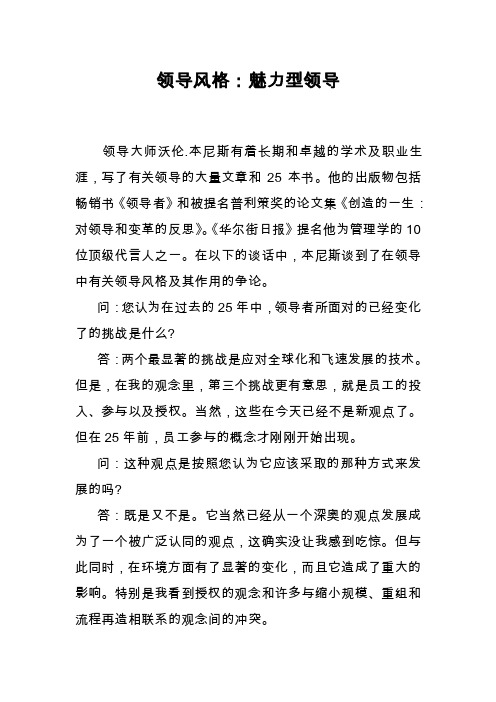
领导风格:魅力型领导领导大师沃伦.本尼斯有着长期和卓越的学术及职业生涯,写了有关领导的大量文章和25本书。
他的出版物包括畅销书《领导者》和被提名普利策奖的论文集《创造的一生:对领导和变革的反思》。
《华尔街日报》提名他为管理学的10位顶级代言人之一。
在以下的谈话中,本尼斯谈到了在领导中有关领导风格及其作用的争论。
问:您认为在过去的25年中,领导者所面对的已经变化了的挑战是什么?答:两个最显著的挑战是应对全球化和飞速发展的技术。
但是,在我的观念里,第三个挑战更有意思,就是员工的投入、参与以及授权。
当然,这些在今天已经不是新观点了。
但在25年前,员工参与的概念才刚刚开始出现。
问:这种观点是按照您认为它应该采取的那种方式来发展的吗?答:既是又不是。
它当然已经从一个深奥的观点发展成为了一个被广泛认同的观点,这确实没让我感到吃惊。
但与此同时,在环境方面有了显著的变化,而且它造成了重大的影响。
特别是我看到授权的观念和许多与缩小规模、重组和流程再造相联系的观念间的冲突。
问:本尼斯先生,对于未来和过去有关领导的挑战,您已经告诉了我们一些有趣的看法。
把它们看作一个整体,领导者要成为好领导与他们所处的时代是否无关?或者,一个成功的世界领导者,比如丘吉尔,在今天的英国是否会由于缺乏在这个时间点上所需要的技能或领导风格而失败呢?答:在回答你的问题时,让我对照俄国小说家托尔斯泰和英国历史学家卡莱尔的观点。
托尔斯泰认为,人总是事件的结果而非原因,事件有它自身的历史动力,并且领导者最好能指导前进的方向。
这种情境主义的观点与卡莱尔的观点有显著差异,卡莱尔认为历史是自传的连续体,每一种权威规则都是”一个伟人的长度与广度”。
我个人倾向于卡莱尔的观点,并相信是伟大的领导者创造了情境,而且情境现在在哪里并不重要,重要的是它正朝着什么方向。
正如我最喜欢的管理哲学家维尼.格莱茨基指出的:”问题不在于冰球在哪里;而在于它将去向哪里。
”一位有效的领导者能透过现实的迷雾来看待事情,并且能理解模糊和暧昧的复杂性。
领导力培训——团队管理和领导力

领导力提升训练
Team management and leadership
领导力提升的方法
1、领导力概述
(1)领导力就是领导获得追随者、实现共同愿景的能力。 (2)领导力分为组织领导力和个体领导力,个体领导力是组织领导力的基础。
领导力表现在三个方面:
“跟我来”
01
令人信服的远见
卓识
“看我的”令人
02
Team management and leadership
2、了解团队成员的
12个
需求
01】在工作中知道公司对我有什么期望
07】在工作中我的意见一定有人听取
02】我有把工作做好所必需的工具和设备
08】公司的使命或目标使我感到工作的重要性
03】在工作中有机会做我擅长的事 04】在过去的7天里,我出色的工作表现
Team management and leadership
3 放权的 要素
明确所要 承担的相 应责任
任务
有明确的 目标和信 息要求
权利
给予权利, 让其充分 做主
责任
单击此处 添加正文。
给你一个团队,你能怎么管?
Team management and leadership
管理者
01. 好的管理者必须是造梦大师 03. 变革,具有创新力 05. 健全制度,末位淘汰
第二维度:行为
• 行为维度的精髓在于 增进信任!
• 活在当下 • 负起责任
第三维度:空间
• 我们周围的空间有3A 个维(上下,前後, 左右)
第四维度:时间
• 已存在的影响力会随 时间的流逝而减弱
• 正在形成的影响力会 随时间的推进而增强
领导力提升训练
关于魅力型领导和远见型领导的问题

关于魅力型领导和远见型领导的问题
魅力型领导和远见型领导是领导力中两个重要的概念。
魅力型领导是指那些具有强烈吸引力和影响力的领导,能够赢得团队成员的信任和支持。
远见型领导则是指那些具有长远眼光和决策能力的领导,能够为组织制定正确的战略和规划。
在实际应用中,魅力型领导和远见型领导都有其优点和局限性。
魅力型领导可以有效地激励团队成员,增强团队凝聚力和合作精神,但有时也会出现个人主义和虚伪的情况。
而远见型领导则可以为组织带来长远的利益和发展,但有时也会因为过分关注未来而忽视当前的问题。
因此,在实际应用中,领导者应该根据组织的需求和情况灵活运用魅力型领导和远见型领导的优点,平衡两者的局限性,从而达到组织的最优效果。
同时,领导者也应该不断提升自己的领导力,不断学习和反思,以更好地适应不同的组织环境和变化。
总之,魅力型领导和远见型领导的问题是一个复杂且不断发展的话题,需要领导者不断地学习、思考和实践,才能在实际应用中取得最佳效果。
领导能力测试和管理基础知识试题及答案
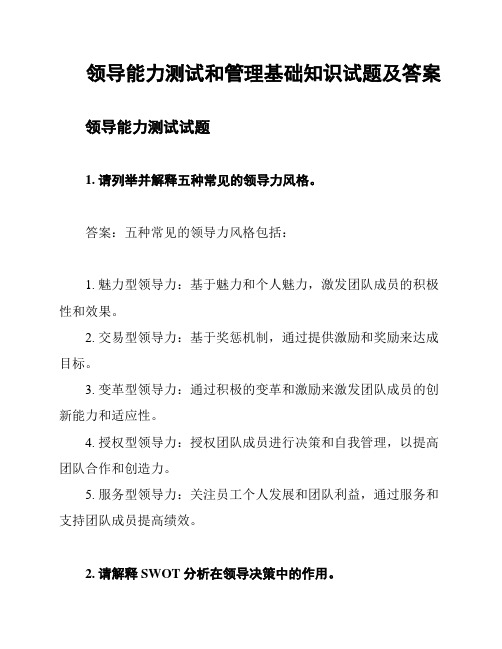
领导能力测试和管理基础知识试题及答案领导能力测试试题1. 请列举并解释五种常见的领导力风格。
答案:五种常见的领导力风格包括:1. 魅力型领导力:基于魅力和个人魅力,激发团队成员的积极性和效果。
2. 交易型领导力:基于奖惩机制,通过提供激励和奖励来达成目标。
3. 变革型领导力:通过积极的变革和激励来激发团队成员的创新能力和适应性。
4. 授权型领导力:授权团队成员进行决策和自我管理,以提高团队合作和创造力。
5. 服务型领导力:关注员工个人发展和团队利益,通过服务和支持团队成员提高绩效。
2. 请解释SWOT分析在领导决策中的作用。
答案:SWOT分析是一种用来评估组织或个人的优势、劣势、机会和威胁的框架。
在领导决策中,SWOT分析可以提供全面的信息,帮助了解当前的情况和潜在的挑战。
通过分析自身的优势和劣势,以及外部环境中的机会和威胁,领导者可以做出明智的战略决策,制定可行的目标和计划。
管理基础知识试题1. 请解释组织结构中的垂直和水平层次。
答案:在组织结构中,垂直层次指的是管理层次的上下关系,包括高级管理人员、中层管理人员和基层员工。
水平层次指的是同级别的管理人员和员工之间的关系。
2. 请解释市场营销的4Ps原理。
答案:市场营销的4Ps原理是指产品(Product)、价格(Price)、渠道(Place)和推广(Promotion)。
这四个方面是市场营销中最重要的要素。
产品指的是企业提供给消费者的商品或服务;价格指的是产品的定价策略和定价水平;渠道指的是产品的分销和销售渠道;推广指的是通过广告、促销等方式来推动产品的销售。
这些试题和答案帮助了解领导能力和管理基础知识的重要概念,通过测试和学习,可以更好地提升和发展个人的领导和管理能力。
领导力五力模型研究
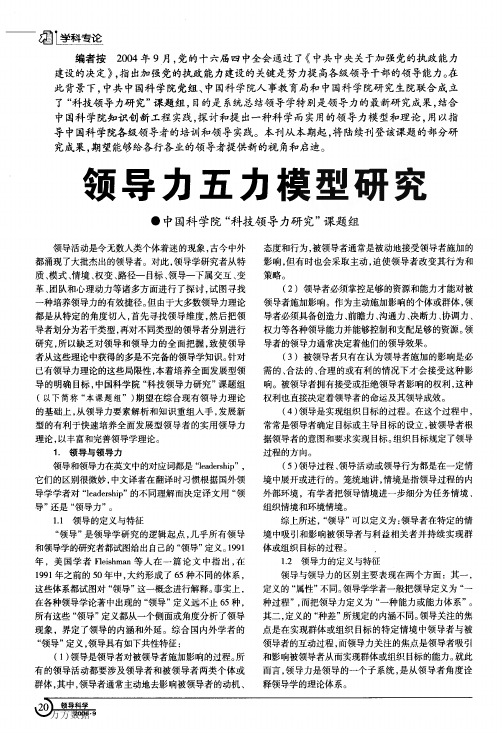
——圆1堂型童迨编者按2004年9月,党的十六届四中全会通过了《中共中央关于加强党的执政能力建设的决定》,指出加强党的执政能力建设的关键是努力提高各级领导干部的领导能力。
在此背景下,中共中国科学院党组、中国科学院人事教育局和中国科学院研究生院联合成立了“科技领导力研究”课题组,目的是系统总结领导学特别是领导力的最新研究成果,结合中国科学院知识创新工程实践,探讨和提出一种科学而实用的领导力模型和理论,用以指导中国科学院各级领导者的培训和领导实践。
本刊从本期起,将陆续刊登该课题的部分研究成果,期望能够给各行各业的领导者提供新的视角和启迪。
领导力五力模型研究●中国科学院“科技领导力研究”课题组领导活动是令无数人类个体着迷的现象,古今中外都涌现了大批杰出的领导者。
对此,领导学研究者从特质、模式、情境、权变、路径一目标、领导一下属交互、变革、团队和心理动力等诸多方面进行了探讨,试图寻找一种培养领导力的有效捷径。
但由于大多数领导力理论都是从特定的角度切入,首先寻找领导维度,然后把领导者划分为若干类型,再对不同类型的领导者分别进行研究,所以缺乏对领导和领导力的全面把握,致使领导者从这些理论中获得的多是不完备的领导学知识。
针对已有领导力理论的这些局限性,本着培养全面发展型领导的明确目标,中国科学院“科技领导力研究”课题组(以下简称“本课题组”)期望在综合现有领导力理论的基础上,从领导力要素解析和知识重组人手,发展新型的有利于快速培养全面发展型领导者的实用领导力理论,以丰富和完善领导学理论。
1.领导与领导力领导和领导力在英文中的对应词都是“leadership”,它们的区别很微妙,中文译者在翻译时习惯根据国外领导学学者对“leadership”的不同理解而决定译文用“领导”还是“领导力”。
1.1领导的定义与特征“领导”是领导学研究的逻辑起点,几乎所有领导和领导学的研究者都试图给出自己的“领导”定义。
1991年,美国学者Fleishman等人在一篇论文中指出,在1991年之前的50年中,大约形成了65种不同的体系,这些体系都试图对“领导”这一概念进行解释。
领导理论

一、领导特性理论(Trait theories) 1、传统的特性理论 2、现 代特性理论 3、魅力型领导 (Charismatic leadership) 4、管理者胜任力 (Managerial competencies) 5、领导艺术(Romance of leadership)
管理方格理论 (Manageme nt Grid Theory)是研 究企业的领导 方式及其有效 性的理论,这 种理论倡导用 方格图表示和
管理方格理 论 五种典型方 式
研究领导方式。
贫乏型管理:领导者仅付出最低限度的努力以完成任务 和维系组织成员的关系,既不关心职工,也不关心任务或生 产。 乡村俱乐部型管理.领导者对员工关怀备至,充分注 意搞好人际关系,从而形成友好愉快的组织氛围,但对生产 或任务的关心极少。 任务型管理.工作任务或生产得到精 心的组织和安排,而将个人因素的干扰限制到最低程度,以 求得到效率,但对人却漠不关心。 中间型管理.领导者对 人,对生产都给予中等程度的关心,在完成必要的工作与保 持令人满意的士气之间进行平衡,使组织绩效达到可接受的 水平 团队型管理.领导者对人,对生产都极为关心,把员工 的利益与实现组织的目标高度地结合起来,大家齐心协力地 完成任务。
领导者很少运用权力,而把权力定位于成 员,著名企管专家谭小芳表示,给下属高 度的独立自主权,制定计划、决策、推行 工作,领导者只布置任务及提供资料,很 少参与执导、协调、监督、检查等职责。 此方式使用比较少。适用于知识、技能成 熟,能自我指挥与控制的少数专业人员。 能充分发挥成员的聪明才智;促进产生新 观念、新设想、新技术。
管理者倾向于把工作视
领导者的工作则具有高
为可以达到的过程 管理者喜欢与人打交道 的工作,他们根据自己 在事件和决策过程中所 扮演的角色与他人发生 联系; 管理是有效地把事情做 好
领导力九九风格
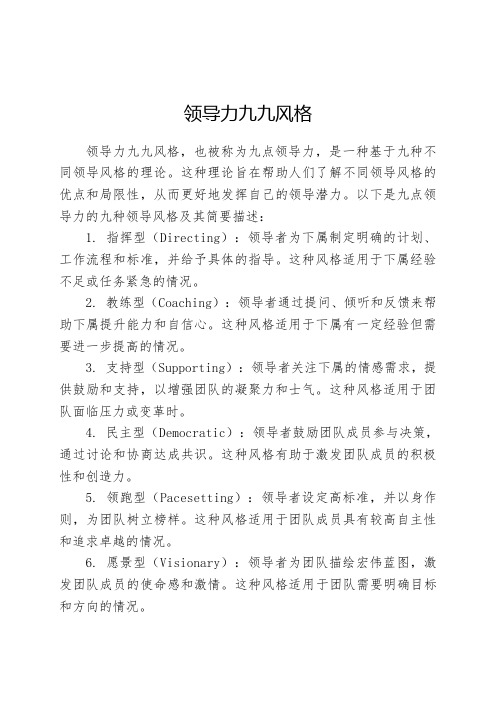
领导力九九风格领导力九九风格,也被称为九点领导力,是一种基于九种不同领导风格的理论。
这种理论旨在帮助人们了解不同领导风格的优点和局限性,从而更好地发挥自己的领导潜力。
以下是九点领导力的九种领导风格及其简要描述:1. 指挥型(Directing):领导者为下属制定明确的计划、工作流程和标准,并给予具体的指导。
这种风格适用于下属经验不足或任务紧急的情况。
2. 教练型(Coaching):领导者通过提问、倾听和反馈来帮助下属提升能力和自信心。
这种风格适用于下属有一定经验但需要进一步提高的情况。
3. 支持型(Supporting):领导者关注下属的情感需求,提供鼓励和支持,以增强团队的凝聚力和士气。
这种风格适用于团队面临压力或变革时。
4. 民主型(Democratic):领导者鼓励团队成员参与决策,通过讨论和协商达成共识。
这种风格有助于激发团队成员的积极性和创造力。
5. 领跑型(Pacesetting):领导者设定高标准,并以身作则,为团队树立榜样。
这种风格适用于团队成员具有较高自主性和追求卓越的情况。
6. 愿景型(Visionary):领导者为团队描绘宏伟蓝图,激发团队成员的使命感和激情。
这种风格适用于团队需要明确目标和方向的情况。
7. 亲和型(Affiliative):领导者强调团队合作和人际关系,致力于营造和谐的工作氛围。
这种风格有助于增强团队成员之间的信任和合作。
8. 变革型(Transformational):领导者鼓励团队成员挑战现状,勇于创新,推动组织变革和发展。
这种风格适用于团队需要适应快速变化的环境或突破困境的情况。
9. 服务型(Servant Leadership):领导者关注团队成员的需求和利益,致力于为他们提供支持和帮助。
这种风格强调领导者的服务意识和奉献精神,有助于提升团队成员的满意度和忠诚度。
以上九种领导风格并非孤立存在,而是可以相互融合和转换的。
在实际应用中,领导者应根据团队的特点、任务的需求以及自身的优势来选择合适的领导风格。
领导力的五个模型
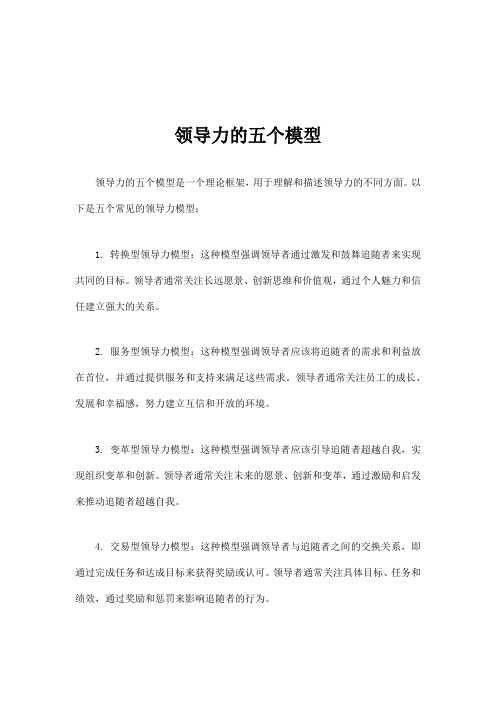
领导力的五个模型
领导力的五个模型是一个理论框架,用于理解和描述领导力的不同方面。
以下是五个常见的领导力模型:
1. 转换型领导力模型:这种模型强调领导者通过激发和鼓舞追随者来实现共同的目标。
领导者通常关注长远愿景、创新思维和价值观,通过个人魅力和信任建立强大的关系。
2. 服务型领导力模型:这种模型强调领导者应该将追随者的需求和利益放在首位,并通过提供服务和支持来满足这些需求。
领导者通常关注员工的成长、发展和幸福感,努力建立互信和开放的环境。
3. 变革型领导力模型:这种模型强调领导者应该引导追随者超越自我,实现组织变革和创新。
领导者通常关注未来的愿景、创新和变革,通过激励和启发来推动追随者超越自我。
4. 交易型领导力模型:这种模型强调领导者与追随者之间的交换关系,即通过完成任务和达成目标来获得奖励或认可。
领导者通常关注具体目标、任务和绩效,通过奖励和惩罚来影响追随者的行为。
5. 共享型领导力模型:这种模型强调领导者与追随者之间的共同决策和合作,即通过集体智慧和协作来达成共同的目标。
领导者通常关注团队的协作、共同价值观和目标,通过建立团队文化和促进对话来促进集体行动。
以上五种领导力模型各有特点,但都是为了提高领导者的素质和能力,以更好地影响追随者并实现共同的目标。
在实际应用中,领导者可以根据组织文化、情境和任务选择适合的领导力模型,以更好地发挥领导作用。
新型领导理论

情境领导
情境领导( Leadership) 情境领导(Situational Leadership)有别于传统领导的特质 理论,不仅只重视领导者行为能力的修炼, 理论,不仅只重视领导者行为能力的修炼,情境领导特别强调领 导要因人而异,因材施教.情境领导的三大技巧是:诊断, 导要因人而异,因材施教.情境领导的三大技巧是:诊断,弹性 与约定领导形态.诊断是评估部属在发展阶段的需求; 与约定领导形态.诊断是评估部属在发展阶段的需求;弹性是能 轻松自在的使用不同的领导形态; 轻松自在的使用不同的领导形态;约定领导形态是与部属建立伙 伴关系,与部属协议他所需要的领导形态. 伴关系,与部属协议他所需要的领导形态.情境领导能改善主管 与部属间的沟通,增加默契的培养, 与部属间的沟通,增加默契的培养,并使主管能够了解部属的发 展需求,给予必要的协助.就个人角度而言, 展需求,给予必要的协助.就个人角度而言,影响人员绩效的因 素有能力问题与意愿问题,一种是不会做,一种是不愿做, 素有能力问题与意愿问题,一种是不会做,一种是不愿做,也有 交错变化的不同发展状况. 交错变化的不同发展状况.情境领导提出了主管除了要正确诊断 掌握部属的发展阶段外,也要学习采用正确的领导行为, 掌握部属的发展阶段外,也要学习采用正确的领导行为,包括处 理能力问题的命令行为,及处理意愿问题的支持行为, 理能力问题的命令行为,及处理意愿问题的支持行为,这是主管 最重要的两项领导行为,运用得宜谓之弹性. 最重要的两项领导行为,运用得宜谓之弹性.
魅力型领导理论浅谈

魅力型领导理论浅谈作者:孙方来源:《商情》2013年第30期[摘要]在过去的五十多年中,对领导力的研究远远超过任何一个与组织相关的论题。
魅力型领导理论从20世纪80年代起,日益受到研究者的重视。
这是因为随着全球经济的发展,市场竞争日趋激烈,各类组织,尤其是企业组织迫切需要魅力型领导者的改革和创新精神,以应对环境的挑战。
[关键词]领导力;魅力型领导;领导魅力;人力资源领导力源自英文中的Leadership一词,国内相关方面的译作多译为领导。
根据Webster’s New World Dictionary注明的第二条词意,Leadership为the ability to lead,即领导能力,强调领导职能的影响力。
一、领导力的定义关于领导力的定义很多,1983年德鲁克认为“领导力就是愿景”。
“领导力,就是带领其他人走到从未走过的地方的能力。
”——这是詹姆斯·库泽斯和巴里·波斯纳在其经典著作“领导力》一书中,对领导力给出的定义。
尽管在很多组织中管理与领导这两个术语常常是混用的,但是随着商业环境的变化,其内涵已经有了实质性的发展。
关于领导的研究报告、杂志文章、书籍大约有40000之多。
结果是,关于领导的定义,众说风云。
下面是一些关于领导的有代表性的定义:(1)人际影响力,贯穿于所有指向目标实现的沟通;(2)影响力的不断积累,超越于对指导和命令的机械服从;(3)一种行动,他促成他人以共同的方向行动或影响;(4)影响他人的艺术,它劝服或示范他人遵循一系列行为;(5)激励和协调组织实现目标的主要动力;(6)一种意愿,勇于承担责任。
二、领导对组织绩效的影响领导是一个团队的灵魂人物。
无论组织的形式和大小怎样,领导力都对组织的绩效产生至关重要的影响。
研究领导的一个基础性假设是,领导影响组织的绩效。
面对重大组织问题所经常采取的政策就是更换领导,以期新任命的领导者能够力挽狂澜,解决绩效问题。
实际的研究认为,领导者实际上影响组织绩效和士气。
高级经济师实务工商管理-第二节团体领导
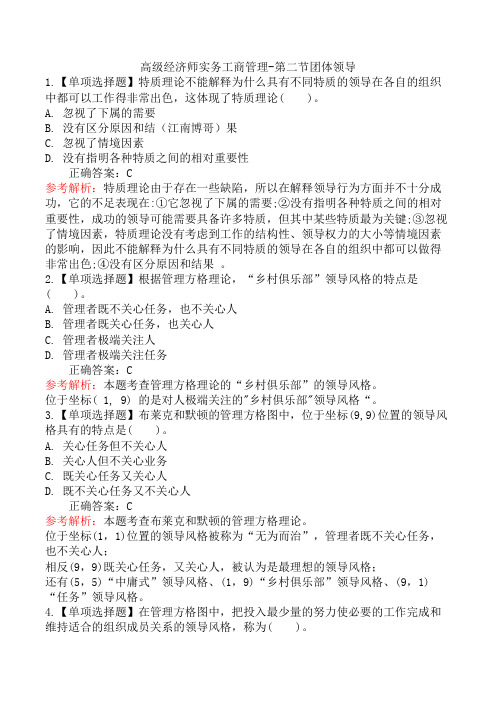
高级经济师实务工商管理-第二节团体领导1.【单项选择题】特质理论不能解释为什么具有不同特质的领导在各自的组织中都可以工作得非常出色,这体现了特质理论( )。
A. 忽视了下属的需要B. 没有区分原因和结(江南博哥)果C. 忽视了情境因素D. 没有指明各种特质之间的相对重要性正确答案:C参考解析:特质理论由于存在一些缺陷,所以在解释领导行为方面并不十分成功,它的不足表现在:①它忽视了下属的需要;②没有指明各种特质之间的相对重要性,成功的领导可能需要具备许多特质,但其中某些特质最为关键;③忽视了情境因素,特质理论没有考虑到工作的结构性、领导权力的大小等情境因素的影响,因此不能解释为什么具有不同特质的领导在各自的组织中都可以做得非常出色;④没有区分原因和结果。
2.【单项选择题】根据管理方格理论,“乡村俱乐部”领导风格的特点是( )。
A. 管理者既不关心任务,也不关心人B. 管理者既关心任务,也关心人C. 管理者极端关注人D. 管理者极端关注任务正确答案:C参考解析:本题考查管理方格理论的“乡村俱乐部”的领导风格。
位于坐标( 1, 9) 的是对人极端关注的"乡村俱乐部"领导风格“。
3.【单项选择题】布莱克和默顿的管理方格图中,位于坐标(9,9)位置的领导风格具有的特点是( )。
A. 关心任务但不关心人B. 关心人但不关心业务C. 既关心任务又关心人D. 既不关心任务又不关心人正确答案:C参考解析:本题考查布莱克和默顿的管理方格理论。
位于坐标(1,1)位置的领导风格被称为“无为而治”,管理者既不关心任务,也不关心人;相反(9,9)既关心任务,又关心人,被认为是最理想的领导风格;还有(5,5)“中庸式”领导风格、(1,9)“乡村俱乐部”领导风格、(9,1)“任务”领导风格。
4.【单项选择题】在管理方格图中,把投入最少量的努力使必要的工作完成和维持适合的组织成员关系的领导风格,称为( )。
A. “无为而治”领导风格B. “中庸式”领导风格C. “任务”领导风格D. “乡村俱乐部”领导风格正确答案:A参考解析:本题考查管理方格图。
中级经济师第二章领导行为知识点复习笔记

第二章领导行为【本章概览】第一节领导理论知识点一:导言★【主要内容】1.领导是能够影响群体、影响他人进而完成组织目标的人。
2.领导具有两个特征:第一,领导必须具备影响力;第二,必须具备指导和激励的能力。
3.领导力的来源:领导的影响力主要来源于组织的正式任命。
也可以从其他方面获得,如:生产班组中技能水平最高、经验最丰富的员工往往对其他员工具有非正式的影响力。
知识点二:特质理论★传统特质理论主要观点:(1)领导具有某些固定的特质,并且这些特质是与生俱来的;(2)只有先天具备某些特质的人才可能成为领导。
关于卓越的领导的特质的不同观点人物吉伯斯道格迪尔观点(1)身强力壮(2)聪明但不能过分聪明(3)外向有支配欲(4)有良好的调试能力(5)自信(1)对所完成的工作具有责任感(2)在追求目标的过程中充满热情并且能够持之以恒(3)解决问题时勇于冒险并富有创新精神(4)勇于实践(5)自信(6)能很好地处理人力紧张并能够忍受挫折特质理论的缺陷:(1)没有明确各特质之间的相对重要性。
(2)没有区分原因和结果。
(与绩效的关系)(3)忽视了情境因素。
(工作的结构性、权力大小等)(4)忽视了下属的需要。
知识点三:交易型和变革型领导理论★★【主要内容】领导类型定义特征交易型领导关注任务的完成及员工的顺从,强调任务明晰度、工作标准及产出。
依靠组织奖励、惩罚影响员工绩效(1)奖励:员工努力或员工绩效高,会被奖励(2)差错管理(积极型):及时观察背离标准行为并修正(3)差错管理(消极型):背离标准行为时才进行干预(4)放任:放弃管理,不做出决策变革型领导(1)强调理想与组织价值观来激励追随者们(2)为组织制定明确的愿景(3)通过领导风格来影响员工和团队的绩效(1)魅力:描述愿景,给予员工自豪感、尊敬和信任(2)激励:以高期望激励员工(3)智慧型刺激:谨慎、理性且智慧性解决问题(4)个性化关怀:个性化的以人为本,提供培训与建议【主要内容】研究结论:伯恩斯认为,交易型领导风格是一种相对平庸的管理模式;变革型领导才能在革新和变化中创造超额绩效。
魅力型领导理论分析
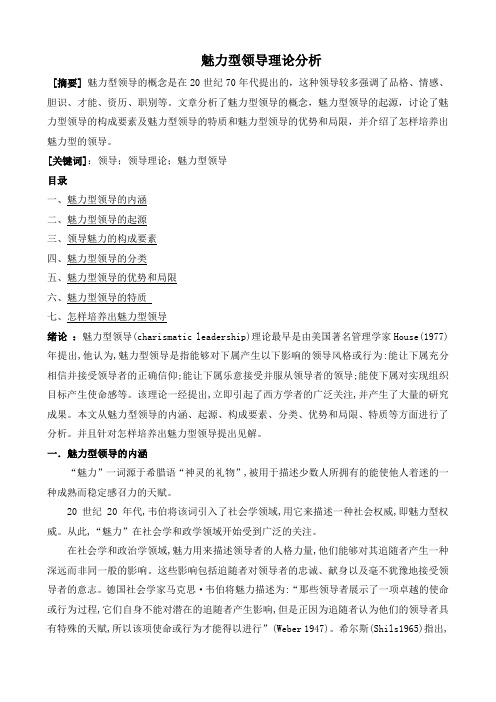
魅力型领导理论分析[摘要] 魅力型领导的概念是在20世纪70年代提出的,这种领导较多强调了品格、情感、胆识、才能、资历、职别等。
文章分析了魅力型领导的概念,魅力型领导的起源,讨论了魅力型领导的构成要素及魅力型领导的特质和魅力型领导的优势和局限,并介绍了怎样培养出魅力型的领导。
[关键词]:领导;领导理论;魅力型领导目录一、魅力型领导的内涵二、魅力型领导的起源三、领导魅力的构成要素四、魅力型领导的分类五、魅力型领导的优势和局限六、魅力型领导的特质七、怎样培养出魅力型领导绪论:魅力型领导(charismatic leadership)理论最早是由美国著名管理学家House(1977)年提出,他认为,魅力型领导是指能够对下属产生以下影响的领导风格或行为:能让下属充分相信并接受领导者的正确信仰;能让下属乐意接受并服从领导者的领导;能使下属对实现组织目标产生使命感等。
该理论一经提出,立即引起了西方学者的广泛关注,并产生了大量的研究成果。
本文从魅力型领导的内涵、起源、构成要素、分类、优势和局限、特质等方面进行了分析。
并且针对怎样培养出魅力型领导提出见解。
一.魅力型领导的内涵“魅力”一词源于希腊语“神灵的礼物”,被用于描述少数人所拥有的能使他人着迷的一种成熟而稳定感召力的天赋。
20世纪20年代,韦伯将该词引入了社会学领域,用它来描述一种社会权威,即魅力型权威。
从此,“魅力”在社会学和政学领域开始受到广泛的关注。
在社会学和政治学领域,魅力用来描述领导者的人格力量,他们能够对其追随者产生一种深远而非同一般的影响。
这些影响包括追随者对领导者的忠诚、献身以及毫不犹豫地接受领导者的意志。
德国社会学家马克思·韦伯将魅力描述为:“那些领导者展示了一项卓越的使命或行为过程,它们自身不能对潜在的追随者产生影响,但是正因为追随者认为他们的领导者具有特殊的天赋,所以该项使命或行为才能得以进行”(Weber 1947)。
希尔斯(Shils1965)指出,韦伯认为魅力型领导方式是一个过程,是原有的社会进程规范和法律规则被加以改变的过程。
领导权与领导力
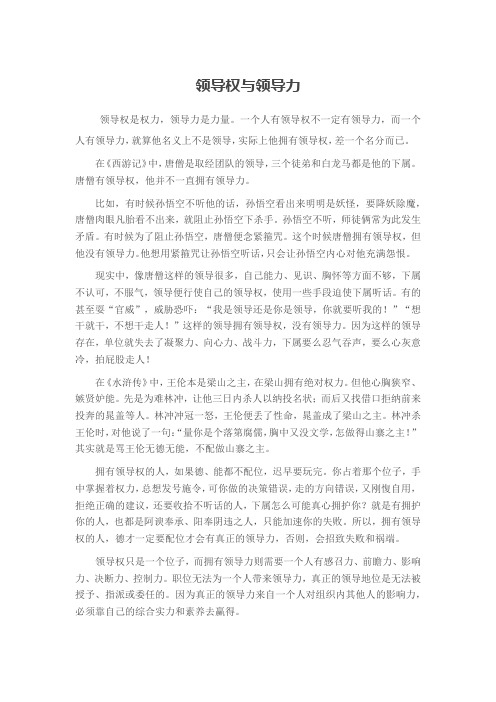
领导权与领导力领导权是权力,领导力是力量。
一个人有领导权不一定有领导力,而一个人有领导力,就算他名义上不是领导,实际上他拥有领导权,差一个名分而已。
在《西游记》中,唐僧是取经团队的领导,三个徒弟和白龙马都是他的下属。
唐僧有领导权,他并不一直拥有领导力。
比如,有时候孙悟空不听他的话,孙悟空看出来明明是妖怪,要降妖除魔,唐僧肉眼凡胎看不出来,就阻止孙悟空下杀手。
孙悟空不听,师徒俩常为此发生矛盾。
有时候为了阻止孙悟空,唐僧便念紧箍咒。
这个时候唐僧拥有领导权,但他没有领导力。
他想用紧箍咒让孙悟空听话,只会让孙悟空内心对他充满怨恨。
现实中,像唐僧这样的领导很多,自己能力、见识、胸怀等方面不够,下属不认可,不服气,领导便行使自己的领导权,使用一些手段迫使下属听话。
有的甚至耍“官威”,威胁恐吓:“我是领导还是你是领导,你就要听我的!”“想干就干,不想干走人!”这样的领导拥有领导权,没有领导力。
因为这样的领导存在,单位就失去了凝聚力、向心力、战斗力,下属要么忍气吞声,要么心灰意冷,拍屁股走人!在《水浒传》中,王伦本是梁山之主,在梁山拥有绝对权力。
但他心胸狭窄、嫉贤妒能。
先是为难林冲,让他三日内杀人以纳投名状;而后又找借口拒纳前来投奔的晁盖等人。
林冲冲冠一怒,王伦便丢了性命,晁盖成了梁山之主。
林冲杀王伦时,对他说了一句:“量你是个落第腐儒,胸中又没文学,怎做得山寨之主!”其实就是骂王伦无德无能,不配做山寨之主。
拥有领导权的人,如果德、能都不配位,迟早要玩完。
你占着那个位子,手中掌握着权力,总想发号施令,可你做的决策错误,走的方向错误,又刚愎自用,拒绝正确的建议,还要收拾不听话的人,下属怎么可能真心拥护你?就是有拥护你的人,也都是阿谀奉承、阳奉阴违之人,只能加速你的失败。
所以,拥有领导权的人,德才一定要配位才会有真正的领导力,否则,会招致失败和祸端。
领导权只是一个位子,而拥有领导力则需要一个人有感召力、前瞻力、影响力、决断力、控制力。
唐僧和宋江为什么有领导力?卫哲:商场如战场,打造组织力要靠这几招
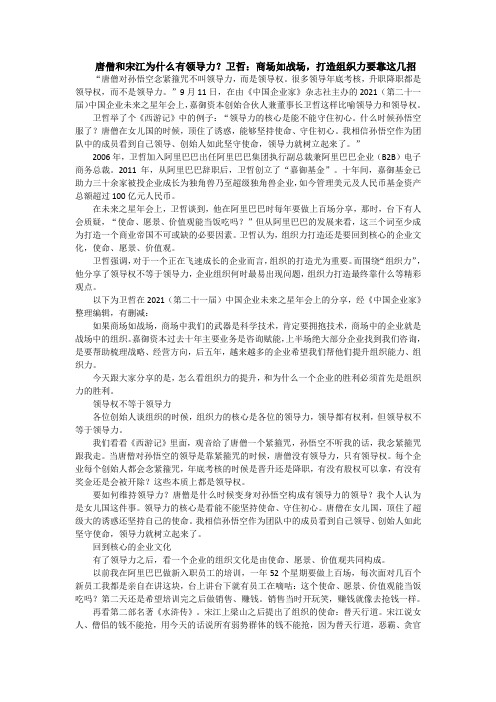
唐僧和宋江为什么有领导力?卫哲:商场如战场,打造组织力要靠这几招“唐僧对孙悟空念紧箍咒不叫领导力,而是领导权。
很多领导年底考核,升职降职都是领导权,而不是领导力。
”9月11日,在由《中国企业家》杂志社主办的2021(第二十一届)中国企业未来之星年会上,嘉御资本创始合伙人兼董事长卫哲这样比喻领导力和领导权。
卫哲举了个《西游记》中的例子:“领导力的核心是能不能守住初心。
什么时候孙悟空服了?唐僧在女儿国的时候,顶住了诱惑,能够坚持使命、守住初心。
我相信孙悟空作为团队中的成员看到自己领导、创始人如此坚守使命,领导力就树立起来了。
”2006年,卫哲加入阿里巴巴出任阿里巴巴集团执行副总裁兼阿里巴巴企业(B2B)电子商务总裁。
2011年,从阿里巴巴辞职后,卫哲创立了“嘉御基金”。
十年间,嘉御基金已助力三十余家被投企业成长为独角兽乃至超级独角兽企业,如今管理美元及人民币基金资产总额超过100亿元人民币。
在未来之星年会上,卫哲谈到,他在阿里巴巴时每年要做上百场分享,那时,台下有人会质疑,“使命、愿景、价值观能当饭吃吗?”但从阿里巴巴的发展来看,这三个词至少成为打造一个商业帝国不可或缺的必要因素。
卫哲认为,组织力打造还是要回到核心的企业文化,使命、愿景、价值观。
卫哲强调,对于一个正在飞速成长的企业而言,组织的打造尤为重要。
而围绕“组织力”,他分享了领导权不等于领导力,企业组织何时最易出现问题,组织力打造最终靠什么等精彩观点。
以下为卫哲在2021(第二十一届)中国企业未来之星年会上的分享,经《中国企业家》整理编辑,有删减:如果商场如战场,商场中我们的武器是科学技术,肯定要拥抱技术,商场中的企业就是战场中的组织。
嘉御资本过去十年主要业务是咨询赋能,上半场绝大部分企业找到我们咨询,是要帮助梳理战略、经营方向,后五年,越来越多的企业希望我们帮他们提升组织能力、组织力。
今天跟大家分享的是,怎么看组织力的提升,和为什么一个企业的胜利必须首先是组织力的胜利。
- 1、下载文档前请自行甄别文档内容的完整性,平台不提供额外的编辑、内容补充、找答案等附加服务。
- 2、"仅部分预览"的文档,不可在线预览部分如存在完整性等问题,可反馈申请退款(可完整预览的文档不适用该条件!)。
- 3、如文档侵犯您的权益,请联系客服反馈,我们会尽快为您处理(人工客服工作时间:9:00-18:30)。
Leadership of Monk TangZ QLIntroductionMonk Tang is a weak and incompetent mortal in most people’s eyes since he can’t do anything else except sitting in meditation and reciting scriptures. A lot of people would attribute his success in obtaining Buddhist scriptures through a long pilgrimage to his three followers’ merit. However, with careful analysis, we can find that he embodied the executive quality required by a successful leader. Without Monk Tang’s unified leadership, Monkey King, Pig and Shahe Shang could never work together as a team in harmony with high efficiency. This paper aims to find out the art of leadership of Monk Tang through analyzing his style of leadership.Skills, Traits, and Sources of Power●Expert powerEffective leaders uses expert power to support followers by providing needed knowledge, being available as a source of advice helping individuals solve problems and referring followers to needed sources of information (Jon P. Howell and Dan L. Mitchell, 2001). Going on a westward pilgrimage for Buddhist scriptures is a great undertaking for the Buddhism. Thus the team leader should have a good knowledge of Buddhist doctrine. With great concentration on learning and practicing Buddhist doctrine, Monk Tang thoroughly understood Buddhist doctrine. Therefore, he had strong expert power and he was honored as an eminent monk of the Tang Dynasty. Whenever the team got in trouble, Monk Tang would sermon to comfort the team and calm everybody down to weather the hard times eventually.●Communication skills & interpersonal skillsMonk Tang usually develops good communication skills, effectively conveying his ideas and feelings, listening actively and carefully, and eliciting ideas and feelings about Buddhism from followers. The ability to listen to followers and understand what they are saying is a key element in showing acceptance and consideration in the scriptures. Mann F. C.(1965) stated, “Interpersonal skills are closely related to communication skills”. When the Monkey King, Pig, Shahe Shang are upset or under pressure, Monk Tang usess Interpersonal skills to provide his social support through positive friendly interpersonal relations that Monk Tang supports followers, cooperates with them, develops trust with them.●Referent powerLeaders whose personality, accomplishments, and integrity causes followers to admire oridentify with them have referent power (Jon P. Howell and Dan L. Mitchell, 2001). The previous life of Monk Tang was a prized disciple of the Buddha. He has extraordinary benevolence and mercy feelings. He was not like those bad leaders met by Monkey King, Pig and Shahe Shang. For example, the Jade Emperor brought draught to the mortal world, Yama talked a lot of nonsense in front of his subordinates and the Dragon King was unwilling to give rain to the mortal world. Although Monk Tang knew nothing about Kung-fu, he was undoubtedly an excellent Buddhist. The power of role model is infinite. His self-cultivation and behaviors helped his followers to change.Supportive leadership behaviorsMonk Tang showed his trust and helped followers develop their abilities respectively. DuBrin, A.J.(1989) stated, “Supportive leadership involves showing well-being and needs of followers. They show trust and respect for followers is a way that enhances followers’ feelings of personal worth and importance. Monk Tang believes all of them have the good abilities and help them develop abilities. Through considerate, encouraging and understanding, Monk Tang enabled every follower to show their value respectively. When they encountered dangerous situations, he would always give those arduous tasks of defeating devils to his first follower. This technical talent could always get tasks that required his talent from the leader. Different from Monkey King, the Pig was technically weak than his senior fellow. However, he has his particular talent, i.e. excellent interpersonal skill. Monk Tang just made the best uses of his advantage and gave the tasks that required more communicative skills than technical skills such as begging alms and asking for directions to him. Shahe Shang was the most dependable and industrious follower. He was responsible for logistic work and taking care of important goods such as cassock. Meanwhile, challenging tasks such as assisting the senior follower to defeat the devil would also be assigned to him at a crucial time.Rewards and punishment behaviorsResearch shows that organizational leaders uses more intangible rewards to influence followers than tangible (Peters and Waterman, 1982). Monk Tang always uses praise, recognition, and appreciation on short notice. For example, Monkey King always be praised in front of the Kings by Monk Tang. At same time, Monk Tang also uses punishment behaviors. For example, when Monkey King makes a mistake, Monk Tang analyzes the reasons for Monkey King’s error at beginning. After Monkey king is still insubordinate, he reads the curse and tights the hoop to avoid the future consequences of undesirable or destructive behaviors. This situation will make the group be more cohesive because at this time, pig and Shahe Shang will intercede for monkey.Charismatic leadership behaviorsBass, B.M.(1990) stated, ”Leaders are described as charismatic if they are perceived as having exceptional qualities that inspire extreme devotion, commitment, and trust; when followers identify themselves with the leader and become emotionally involved in the leader’s mission; and when followers feel increased self-esteem due to their association with the leader.” Tang's monk always instills the organization's vision to the followers which is to go to Buddhist paradise obtained scripture. Monk Tang describes followers' tasks as meaningful, noble, morally correct, and even heroic. Such an "unprecedented or since" goal would be a feat unrivaled in the history, which undoubtedly makes followers believe that their own values will be achieved by carrying out his objectives. This gives a moral quality to followers' task performance, and top service their actions inherently satisfying, which inspires the followers to overcome the difficulties in some extent.ConclusionThe most appropriate leadership style depends on the situation. Therefore, leaders must be flexible and match their leadership style to different kind of situations. I think Monk Tang is flexible and his management art is worth learning, which is crucial for my future career development. First of all, “a good example is the best sermon”, the leader must have good moral cultivation and serve as a good example to establish prestige and convince the subordinates with virtue and personal charisma. Secondly, the leader should be good at ideological work to do a good job in coordinating employees’ cooperation and teamwork and discovering and eliminating misunderstandings between employees to constantly strengthen team cohesion, guide employees to establish the win-win idea of mutual assistance, with active communication, mutual encouragement and mutual improvement. Also, the leader should be adept in grasping each employee’s characteristics to give play to their strengthen, avoid shortcomings and complement each other’s advantage and establish an effective motivation system to enable all employees contribute according to their own ability and grow together in a harmonious, comfortable and up-and-coming environment.ReferencesBass, B.M.(1990). Bass& Stogdill’s Handbook of leadership(3rd ed.).DuBrin, A.J.(1998). Leadership: Research Fingdings, Practices and skills.Jon P. Howell and Dan L. Mitchell (2001), Undastangding behaviors for effective leadership. Mann ,F. C.(1965). Toward understanding the leadership role in formal organizaitons. Peters, T.J. and Waterman, R.H.(1982). In search of Excellence. New York: Harper& RowPodsakoff, P.M. and Todor, W.D.(1985). Relationship between leader reward and punishment behavior and group process and productivity.。
